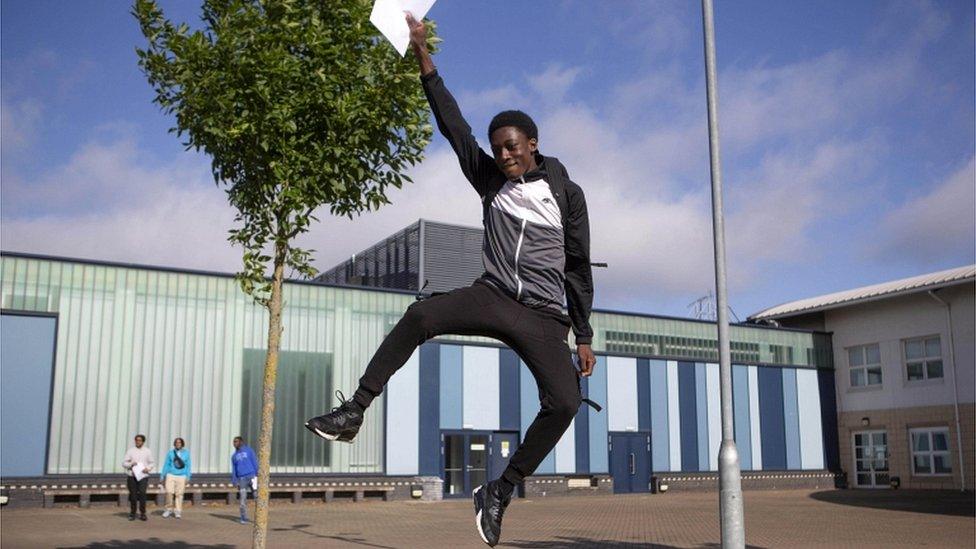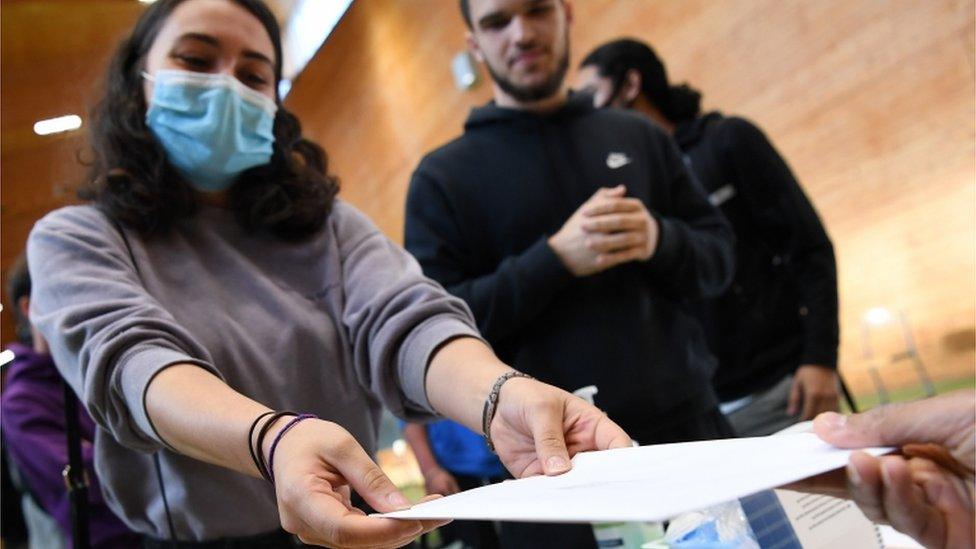A-levels: This year the usual rules don't apply
- Published

It won't just be teenagers with great A-level grades jumping in the air in celebration.
Away from the photographers, Education Secretary Gavin Williamson, the exam boards and watchdogs might be tempted to have a quiet results' day leap of their own.
Because after the chaotic U-turns of last year's exams, this year has been a much smoother run.
It might be because results are way above anything ever seen before, thus fewer reasons to complain.
Last year, the algorithm process saw about 40% of teacher assessed grades being downgraded, this time exam boards only intervened to change 1% of grades.
No bad exam days
It feels as though the exam system has given as many chances as possible to students who have survived two years of unprecedented disruption at school.
As exam officials said in a briefing, these results reflect an ideal world where no one had a bad day in an exam hall and everyone had multiple chances to do well.
Quite right too, say head teachers, who have been irritated at talk of grade inflation, when they say comparisons with other years are meaningless. Ministers who once fulminated against such rising grades have looked the other way.
But there will be consequences for those chasing university places - with warnings of a crush for top places in a year when more people than ever have applied.
University pressure
The sorting process for the most sought-after universities is usually based on the limited number getting top grades.
But over the last two years the proportion of top grades has soared from about 25% to about 45%. In independent schools, it's over 70%, compared with 39% in comprehensives.

Exam results are handed over in a second year of replacement results
The Russell Group of top universities has already said that those who narrowly missed out on required grades will find it harder to get a place - because so many will already have been filled.
Once today's celebrations have finished, there will nervous glances ahead to next year. Because having allowed results to rise like a kite, at what point and how do you pull them down again?
Will there be a long-term plan to get grades back to pre-pandemic levels? And would that mean years of artificially lowered grades? How would that be fair?
Not just a spreadsheet
None of that will be of much concern to those getting their results today. Whether celebrating or commiserating, or a bit of both, this has been the strangest of times to be in an exam year.
What's it really about? Maybe put the percentages aside.
Even when writing this in the office, there was a parent disappearing into a corner with their mobile phone. I heard him taking a moment to speak to his son who had got his results. He was telling his son how proud he was.
There was a bit of a wobble in his voice when he said he'd give him a big hug when he got home.
There are no results in a spreadsheet for that.


What are your plans after A-levels? Have you been offered your first choice of university? Will you go through clearing? Share your stories. Email haveyoursay@bbc.co.uk, external.
Please include a contact number if you are willing to speak to a BBC journalist. You can also get in touch in the following ways:
WhatsApp: +44 7756 165803
Tweet: @BBC_HaveYourSay, external
Please read our terms & conditions and privacy policy
If you are reading this page and can't see the form you will need to visit the mobile version of the BBC website to submit your question or comment or you can email us at HaveYourSay@bbc.co.uk, external. Please include your name, age and location with any submission.
